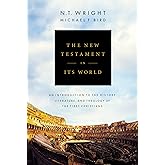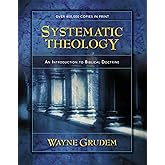
Download the free Kindle app and start reading Kindle books instantly on your smartphone, tablet, or computer - no Kindle device required.
Read instantly on your browser with Kindle for Web.
Using your mobile phone camera - scan the code below and download the Kindle app.

OK
 Audible sample Sample
Audible sample Sample 


Evangelical Theology: A Biblical and Systematic Introduction Hardcover – October 30, 2013
There is a newer edition of this item:
Evangelical Theology is a systematic theology written from the perspective of a biblical scholar. Michael F. Bird contends that the center, unity, and boundary of the evangelical faith is the evangel (= gospel), as opposed to things like justification by faith or inerrancy. The evangel is the unifying thread in evangelical theology and the theological hermeneutic through which the various loci of theology need to be understood.
Using the gospel as a theological leitmotif―an approach to Christian doctrine that begins with the gospel and sees each loci through the lens of the gospel―this text presents an authentically evangelical theology, as opposed to an ordinary systematic theology written by an evangelical theologian.
According to the author, theology is the drama of gospelizing―performing and living out the gospel in the theatre of Christian life. The text features tables, sidebars, and questions for discussion. The end of every part includes a “What to Take Home” section that gives students a run-down on what they need to know. And since reading theology can often be dry and cerebral, the author applies his unique sense of humor in occasional “Comic Belief” sections so that students may enjoy their learning experience through some theological humor added for good measure.
- Print length912 pages
- LanguageEnglish
- PublisherZondervan Academic
- Publication dateOctober 30, 2013
- Dimensions7.63 x 1.75 x 9.38 inches
- ISBN-100310494419
- ISBN-13978-0310494416
Customers who viewed this item also viewed
From the brand

Scroll right for more.
-
-
-

Zondervan Academic serves the needs of Christian scholars, pastors, and students. Since 1931, we have been privileged to partner with the scholarly community to develop Christ-honoring resources in service of the academy and the church worldwide.
Together we produce works in various areas of biblical-theological studies that exhibit faithfulness to historic Christian faith, cultural relevance, excellence, and innovation.
Editorial Reviews
Review
About the Author
Michael F. Bird is academic dean and lecturer in New Testament at Ridley College in Melbourne, Australia. He is the author or editor of more than thirty books, including What Christians Ought to Believe, Seven Things I Wish Christians Knew about the Bible, and Evangelical Theology. He writes at michaelfbird.substack.com and can be followed on twitter @mbird12.
Product details
- Publisher : Zondervan Academic; Illustrated edition (October 30, 2013)
- Language : English
- Hardcover : 912 pages
- ISBN-10 : 0310494419
- ISBN-13 : 978-0310494416
- Item Weight : 3.05 pounds
- Dimensions : 7.63 x 1.75 x 9.38 inches
- Best Sellers Rank: #307,313 in Books (See Top 100 in Books)
- #348 in Christian Systematic Theology (Books)
- #718 in Evangelism
- #1,405 in Christian Education (Books)
- Customer Reviews:
About the author

Michael F. Bird is a leading academic on New Testament studies and Christian Theology. He is Lecturer in Theology at Ridley College in Melbourne, Australia.
Customer reviews
Customer Reviews, including Product Star Ratings help customers to learn more about the product and decide whether it is the right product for them.
To calculate the overall star rating and percentage breakdown by star, we don’t use a simple average. Instead, our system considers things like how recent a review is and if the reviewer bought the item on Amazon. It also analyzed reviews to verify trustworthiness.
Learn more how customers reviews work on AmazonReviews with images
-
Top reviews
Top reviews from the United States
There was a problem filtering reviews right now. Please try again later.
In terms of Christian theology, the gospel is the glue between doctrine, experience, mission, and practice. I submit that an authentic evangelical theology should be a working out of the gospel in the various loci of Christian theology (i.e., the topics in theology like the nature of God, the person and work of Christ, the church, last things, etc.) and then be applied to the sphere of daily Christian life and the offices of Christian leaders. (21)
Evangelical theology, then, is the drama of gospelizing. By “gospelizing” I mean trying to become what the gospel intends believers to be: slaves of Christ, vessels of grace, agents of the kingdom, and a people worthy of God’s name. Dedication to the art of gospelizing is crucial because “evangelicals need to recapture a passion for biblical formation: a desire to be formed, reformed and transformed by the truth and power of the gospel.” To pursue Kevin Vanhoozer’s image, the task of theology is to enable disciples to perform the script of the Scriptures, according to advice of the dramaturge the Holy Spirit, in obedience to the design of the director, Jesus Christ, with the gospel as the theme music, and performed in the theater of the church. The company of the gospel shows what they believe in an open-air performance staged for the benefit of the world. The purpose of gospelizing is to ensure that those who bear Christ’s name walk in Christ’s way. (30-31)
These paragraphs sum up Bird’s goal and also what I believe he achieves quite well in Evangelical Theology.
This book is no joke at eight hundred and sixty five pages. I chose three section so that I could get a taste for how well Bird succeeds in his goal of arranging a systematic around the gospel. I chose “Part One: Prolegomena: Beginning to Talk about God,” “Part Two: The God of the Gospel: The Triune God in Being and Action,” and “Part Five: The Gospel of Salvation.”
The prolegomena was an easy choice because it’s the beginning remarks of how the systematizing will be accomplished. There are a variety of ways this is typically done. Bird falls squarely in the Reformed stream which has systematics like Hodge’s which starts by laying out theology as a scientific method (35) or Calvin’s which start with how we can know God (33). Bird, on the other hand, starts with the gospel. If he did not start there with his stated goal the entire book would have fallen apart. He explains, “The gospel explains why we are in the theological race in the first place, and the gospel is the nexus into the reality of the God who has revealed himself” (41). It was a refreshing stabilizer for the entire book.
Bird excels at taking Scripture, church history, and major biblical themes into account and massaging them into a cohesive unit. He first roots the gospel firmly in Scripture, and not just the New Testament, but he starts and explains the gospel as a story that begins in the Old Testament (“The gospel is part of a story line of promise and fulfillment. That story reaches back into the Hebrew Scriptures and fins its climax in Jesus the Messiah” 51). The depth and breadth is seen well in “Part Five: The Gospel of Salvation,” but more on that later.
Second, he firmly roots the gospel in the apostolic tradition found in the early church.
For the early church, Scripture was not to be read in an arbitrary, introspective, or esoteric way; rather, Scripture was to be read, interpreted, and applied in continuity with the apostolic explanation of the story line of Scripture.
This emphasis must be recovered in American evangelicalism (AE). AE tends to devalue the apostolic tradition and historic liturgy, but Bird demonstrates the gospel was absolutely central for the faith and practice of the early church, as can be seen the earliest creeds and in their practice, and so to lose that tradition is lose at least part of the gospel’s clarity. He explains,
The regula fidei was not an oral tradition that existed parallel to Scripture. The regula fidei was what emerged out of the preaching and teaching of Scripture in the early church. The regula fidei was both derived from Scripture and was the interpretive lens through which Scripture was to be understood. In this perspective, Scripture and tradition mutually reinforce each other. The regula fidei was the attempt to safeguard the authority of Scripture by adopting an interpretive framework sanctioned by Scripture. That took the form, not of a creed, but a general narration of the Christian story as it had been handed on in the early church.
Later the rule was expanded to include reading the Scriptures in light of the Niceno-Constantinopolitan and Chalcedonian clarifications of Christian doctrine. The apostolic teaching gave us the Scriptures, the Scriptures gave us the regula fidei, the regula fidei defined the theological hermeneutics for the canon, and the canon provided the grounds for the subsequent creeds and confessions of the church. . . . [67-68]
To sum up, we should read Scripture in light of tradition for several reasons. (1) We value the testimony of our forefathers in the faith who ran the race ahead of us and in some cases paid for it with their lives. We may not always agree with them, but we ignore them to our peril. (2) The New Testament itself is both a product of the church’s tradition about Jesus and also generated a tradition as to how Scripture should be read and understood. (3) The canon of scripture is ultimately an expression of the rule of faith. (4) The Reformation slogan of sola scripture does not mean only Scripture, but calls for the primacy of Scripture in our theology. (5) Everybody has a tradition, whether they recognize it or not, and we should test our traditions to see if they are biblical and utilize our traditions to help us understand the Bible.
Tradition, therefore, is the consultative norm for theology. Ultimately, tradition is a tool for reading Scripture. Tradition is what the church has learned by reading Scripture. We should read Scripture in light of tradition, and in reflex we must test tradition against the grain of Scripture. In the end we are not slavishly bound by tradition, but we are foolish if we completely ignore it.
I am not calling for traditionalism, by which I mean the veneration of rituals, doc- trines, and liturgies without submitting them to the test of Scripture, simply because they have always been there. I am advocating an approach to biblical interpretation that places Scripture and tradition in a continuous spiral of listening to the text and listening to our forefathers in the faith. As Jaroslav Pelikan put it: “Tradition is the living faith of the dead; traditionalism is the dead faith of the living.” (69-70)
These two emphasis are found through the parts I read. When discussing the trinity, for instance, he does it with Scripture in view, but also with feet firmly planted within the testimony of the early church. He honestly evaluates the struggle to understand the trinity and shows how the apostolic tradition and the liturgy of the church helped shape the Church’s understanding of God as trinity.
Last, I appreciated the balance and thoroughness found in “Part Five: The Gospel of Salvation.” Salvation is discussed within the gospel matrix. Bird describes the relation as follows:
The gospel tells us that God saves in the life, death, and resurrection of Jesus Christ; consequently, salvation is understood as the chief benefit of the gospel. Furthermore, salvation is more than the sojourn of souls into heaven; rather, it is holistic and includes the well-being of body, mind, and soul. Salvation is part of a story (redemptive history) and is applied to the believer in a particular process (order of salvation).
The chapters within this part synthesize the gospel as story and Jesus as fulfillment themes and the application of salvation, as the last sentence from the paragraph above demonstrates. He also says, “The Savior is the content of the gospel and salvation is the goal of the gospel” (494). He never loses focuses from his main task--which is showing how the gospel is the glue of salvation. The synthesis holds up in view of the covenant of grace. He talks about God’s promised covenant love and His kingdom established by covenant righteousness (507). He says, “The plan of God, which we call the covenant of grace, is for God’s people to dwell in God’s place, in God’s presence, under God’s reign” (511). Later he wades into the order of salvation, a favorite for some reformed types, but he does so carefully. Reformed theologians, in my estimation, sometimes error by assuming too much when discussing the order of salvation. Bird couches this chapter with likely’s, and probably’s, and outlines his order according to Romans 8. I appreciate the carefulness.
Evangelical Theology is a systematic you will want on your shelf. From my readings, Bird succeeds in making the gospel central and connecting the doctrines discussed to it. His exegesis is rooted in Scripture, while also not losing site of the history of the church. And overall the text is extremely readable and if you’re a real theology geek, you might even appreciate the bits of theology humor dropped in from time to time. Also, I finished up the parts I was reading for this review after publishing my must reads of 2013, but for what it’s worth Evangelical Theology easily makes that list as a late season addition.
Perhaps my favorite part about this book was Bird’s ability to give viewpoints from several worldviews rather than just giving his alone. By doing this, he did a superb job keeping the bias to a minimal while explaining concepts. When reading this book, it was easy for me to make my own judgements rather than being slammed with his own opinions presented as facts.
Not only was the author’s information well-supported and clear, the author did an amazing job hooking the reader. He would occasionally throw in a humorous hyperbole while explaining a topic. This helped me follow along with everything he said throughout the book
.
So why only four stars?
Throughout the book I found one flaw that tended to be a bit irritating. In many chapters, it was not uncommon for the author to repeat himself several times. Occasionally, I would find myself reading up to three pages of material that was already explained clearly in the first paragraph of the first page. Despite the author’s outstanding efforts to keep his readers attached to the material so that they could understand it, I did find myself becoming slightly frustrated and confused on certain concepts simply because the concept was overstated.
Overall, Evangelical Theology by Michael F Bird is excellent for understanding many key concepts about God, His divine nature, our mission here on Earth, the role of each of the three persons that make up God, and more. Despite the occasional overstating of concepts, the book was easy to read with tons of unbiased information that was backed by other sources.





















